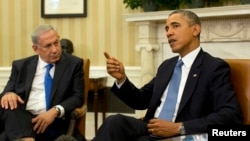WHITE HOUSE —
President Barack Obama and Israeli Prime Minister Benjamin Netanyahu have discussed negotiations with Iran to resolve concerns about its nuclear program. The Israeli leader said Iran must completely dismantle what he called its military nuclear weapons program.
The meeting occurred just days after President Obama and Iranian President Hassan Rouhani spoke by telephone, the first conversation between an American president and an Iranian leader since 1979.
Before Monday's talks, the White House recognized Israeli government skepticism about recent Iranian overtures, including new statements that Iran would not develop nuclear weapons.
After his talks with Netanyahu, Obama said Iran's intentions must be tested and any agreement with Iran must be verifiable.
"It is absolutely clear that words are not sufficient, that we have to have actions that give the international community confidence that, in fact, they are meeting their international obligations fully and they are not in a position to have a nuclear weapon," said President Obama.
Obama said it was the extraordinary international sanctions the international community imposed that brought Iran to the negotiating table.
The U.S. will be "clear-eyed" in negotiations, Obama said, adding that Washington will insist on the "highest standard of verification."
And he repeated that the U.S. takes no options off the table, including military, to ensure that Iran does not obtain a nuclear weapon.
Watch related video by VOA's Jeff Seldin
Netanyahu said he appreciated Obama's making it clear that he remains committed to that goal.
But he laid out what Israel sees as the most important requirement coming out of negotiations with Iran.
"Iran is committed to Israel's destruction. So, for Israel, the ultimate test of a future agreement with Iran is whether or not Iran dismantles its military nuclear program," said Netanyahu.
Maintaining pressure
Netanyahu said sanctions must be maintained until there is verifiable success, and strengthened if Iran continues to advance its nuclear program during negotiations.
The Israeli leader addresses the U.N. General Assembly on Tuesday.
Netanyahu and Obama also discussed Syria, the situation in Egypt, and Israel-Palestinian peace talks.
On Syria, Obama said Israel and the U.S. share broad concerns, including spillover effects of the civil war. He stressed the importance of follow-through on the UN Security Council resolution approved last week to remove and destroy Syrian chemical weapons.
Obama said his government remains committed to a constructive relationship with the government in Cairo, despite concerns about events there.
He said Washington will continue pushing for a direction that is "more inclusive" and that "meets the basic goals of those who originally sought more freedom and democracy."
The meeting occurred just days after President Obama and Iranian President Hassan Rouhani spoke by telephone, the first conversation between an American president and an Iranian leader since 1979.
Before Monday's talks, the White House recognized Israeli government skepticism about recent Iranian overtures, including new statements that Iran would not develop nuclear weapons.
After his talks with Netanyahu, Obama said Iran's intentions must be tested and any agreement with Iran must be verifiable.
"It is absolutely clear that words are not sufficient, that we have to have actions that give the international community confidence that, in fact, they are meeting their international obligations fully and they are not in a position to have a nuclear weapon," said President Obama.
Obama said it was the extraordinary international sanctions the international community imposed that brought Iran to the negotiating table.
The U.S. will be "clear-eyed" in negotiations, Obama said, adding that Washington will insist on the "highest standard of verification."
And he repeated that the U.S. takes no options off the table, including military, to ensure that Iran does not obtain a nuclear weapon.
Watch related video by VOA's Jeff Seldin
Netanyahu said he appreciated Obama's making it clear that he remains committed to that goal.
But he laid out what Israel sees as the most important requirement coming out of negotiations with Iran.
"Iran is committed to Israel's destruction. So, for Israel, the ultimate test of a future agreement with Iran is whether or not Iran dismantles its military nuclear program," said Netanyahu.
Maintaining pressure
Netanyahu said sanctions must be maintained until there is verifiable success, and strengthened if Iran continues to advance its nuclear program during negotiations.
The Israeli leader addresses the U.N. General Assembly on Tuesday.
Netanyahu and Obama also discussed Syria, the situation in Egypt, and Israel-Palestinian peace talks.
On Syria, Obama said Israel and the U.S. share broad concerns, including spillover effects of the civil war. He stressed the importance of follow-through on the UN Security Council resolution approved last week to remove and destroy Syrian chemical weapons.
Obama said his government remains committed to a constructive relationship with the government in Cairo, despite concerns about events there.
He said Washington will continue pushing for a direction that is "more inclusive" and that "meets the basic goals of those who originally sought more freedom and democracy."







